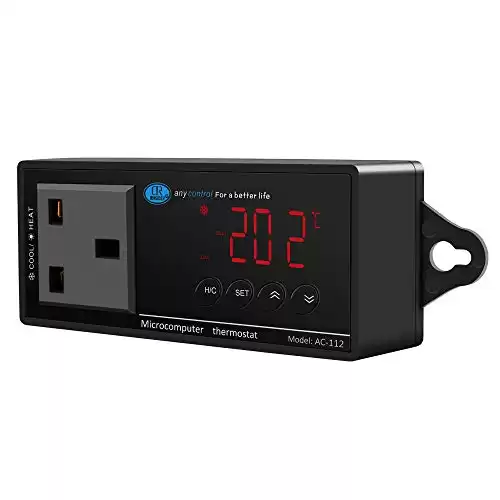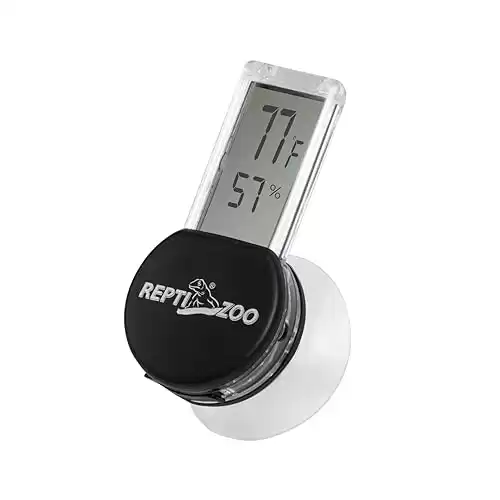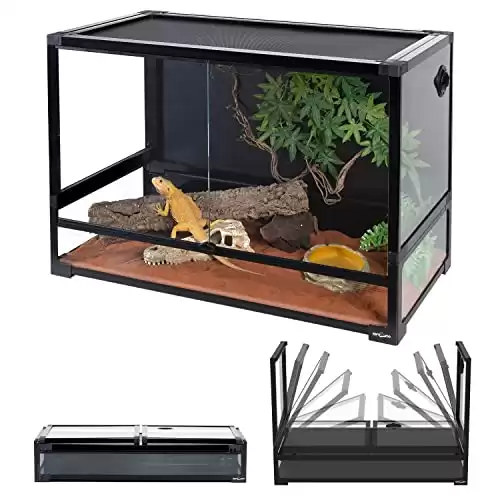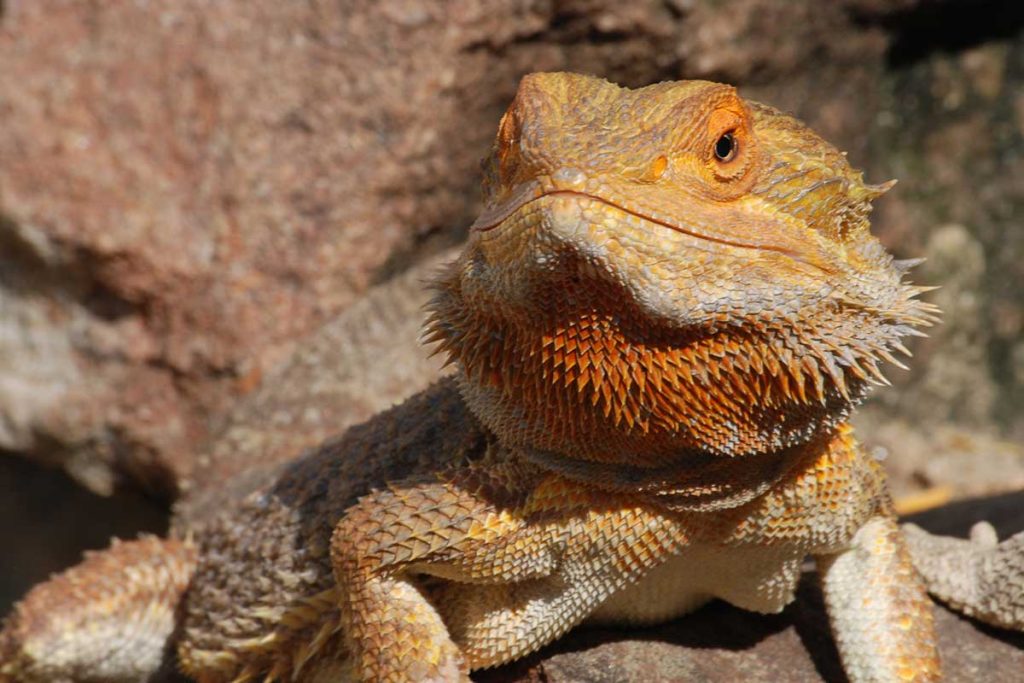
Bearded dragons do not typically breathe very heavily or deeply, so it’s natural to be alarmed if you notice your beardie displaying this behavior.
There are some very normal reasons why your bearded dragon might breathe more heavily than usual, but it can also be a sign of illness or respiratory infections.
In this article we list the normal reasons behind heavy breathing, plus the more serious causes that you need to be aware of.
3 Healthy Reasons Why Your Bearded Dragon Is Breathing Heavily
Normally, bearded dragons have fairly shallow breathing. But breathing heavily can be totally normal for bearded dragons in certain situations, such as:
1. Breathing Heavily Due to Eating
Humans and reptiles digest their food very differently. As mammals, we generate our own heat and have no direct control over our metabolism, digestion or temperature regulation.
Reptiles, on the other hand, are ectotherms. This means they need an external source of heat to keep them warm. They move to warmer or cooler spots in order to speed up or slow down their metabolic process such as digestion! They do all of this by instinct.
After your bearded dragon has eaten, they will most likely go and sit under their basking light. This is so their body warms up enough to fully digest their meal. Bearded dragons need to be fairly hot to digest food.
Gaping
Ideally, your beardie’s basking spot will be around 90°F to 100°F. This is pretty hot, even for a reptile like a bearded dragon, so they may need to open their mouth (known as gaping) and do some deep heavy breathing in order to regulate their temperature while still being hot enough to digest their food.
For a more in-depth look at gaping (open-mouthed breathing), check out our dedicated article on why bearded dragons open their mouths.
The digestive process also takes a lot of effort. This can lead to an increased heart rate, which will also increase your bearded dragon’s depth of breathing.
Your bearded dragon will breathe especially heavily if they are struggling to digest pieces of food that are too big. It is important to always cut your bearded dragon’s food to no larger than the space between their eyes.
If your bearded dragon is breathing heavily because of digestion, they will start breathing normally again fairly shortly, so there is no cause for alarm unless the heavy breathing continues for more than 24 hours.
2. Breathing Heavily Due to Exercise
Just like when we push ourselves with exercise and need to breathe heavily to catch our breath, bearded dragons will do the same!
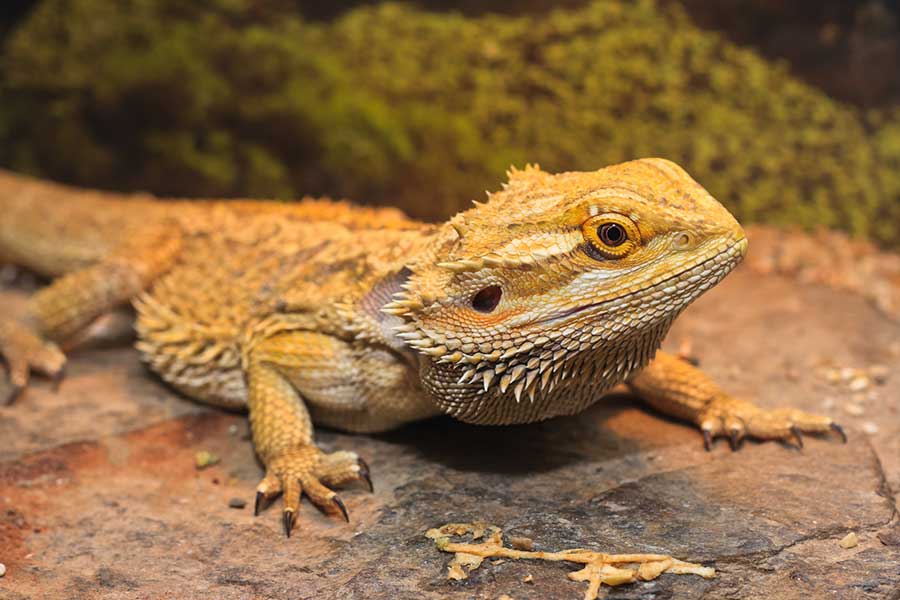
If your bearded dragon has been running around their enclosure, chasing after an insect, or is actively involved in mating rituals, they will be out of breath and will need to breathe heavily for a while to catch their breath and cool down.
There is no need to worry about this if exercise is the reason for heavy breathing, it’s totally normal behavior. In this case, your bearded dragon should breathe heavily for a couple of minutes and then go back to their normal, steady shallow breaths.
Bearded dragons need a lot of exercise and love a good obstacle course. So, this is a great way to experiment with your dragon to monitor their breathing and time how long they start breathing normally again after exercise.
This experiment will help set your mind at ease if you catch them breathing heavily and don’t know why they are doing it. You can time them, and if they exceed the amount of time they usually take to get back to normal, you know something may be wrong and can look for other common reasons for heavy breathing.
3. Breathing Heavily Due to Showing Dominance
Sometimes, owners keep bearded dragons together in the same enclosure for reasons such as breeding. If this is the case for you, your enclosure needs to be a minimum of 40 gallons for a single bearded dragon with an additional 10 gallons added on per additional bearded dragon you add to the enclosure.
The bearded dragons sharing the same enclosure should be of a similar size and weight and there should be a maximum of one male. These are precautions you can put in place to avoid shows of dominance and the resulting stress your submissive bearded dragons will experience.
However, sometimes displays of dominance are inevitable, even if your bearded dragon is not in the enclosure but they can see another bearded dragon across the room or even mistake you as one!
A full display of dominance includes puffing up the beard and the air pouches along the sides of the body. This is to make the bearded dragon (usually male) seem much larger and more intimidating.
Unfortunately the show can take a lot of effort, and the bearded dragon may breathe heavily afterwards in order to catch their breath back.
Just like when they are exercising, monitor your bearded dragon’s ‘recovery time’ until they start breathing normally again. Record the time so you can have it on hand if you catch them breathing heavily for an unknown reason and need to know when to start worrying.
3 Unhealthy Reasons Your Bearded Dragon Is Breathing Heavily
While breathing heavily may be a normal occurrence, in some cases, it can also be a sign of abnormal behavior and potentially serious health issues. Bearded dragons breathe heavily when they are stressed, have taken water into their lungs, or are suffering from respiratory distress.
1. Breathing Heavily Due to Stress
Sometimes, bearded dragons will do some heavy breathing if they are stressed out. Breathing heavily brings a lot of oxygen to the muscles, which helps them to react quickly if they are in a stressful state and need to make quick movements to save their lives in the wild.
There is no way to ‘switch off’ this part of their behavior, as it is what keeps them alive naturally. If your bearded dragon is experiencing stress in the enclosure or during handling, they will start behaving in the only way their body knows how to keep them alive, i.e. breathing heavily.
Your bearded dragon may be experiencing stress for a number of reasons, such as:
- Your bearded dragon can see another bearded dragon in the same or a different enclosure and they are submissive but still stressed out. If this is the cause of their heavy breathing, look for other signs of submission such as arm waving or hiding.
- Your bearded dragon may be able to see natural predators such as dogs, cats, or birds. They could be in the same room as your bearded dragon’s enclosure, or it could even be a neighbor’s cat looking in through the window and your bearded dragon happens to be able to see them.
- The enclosure settings may be incorrect. It may be too hot, too cold, too humid, or too dry in the enclosure, and this will cause your bearded dragon to be stressed. Your bearded dragon’s enclosure should sit between 75°F on the cool end and 90°F on the warm end with a slightly hotter basking spot. Their humidity range should be between 20% and 40%. Beardies are originally from arid desert environments so they don’t need much humidity!
- Your bearded dragon may not have enough hides in their enclosure and feel very exposed. Make sure there are at least two hides in the enclosure per dragon: one on the cooler end and one on the warmer end of the enclosure.
If your bearded dragon is stressed out, look for other signs that coincide with them breathing heavily, such as glass surfing, stress marks, rubbing its face on the ground, excessive digging behavior, hiding, and an unwillingness to eat.
If their heavy breathing coincides with other stress behaviors, start looking for ways to decrease the environmental stressors in the enclosure and watch them carefully for any changes.
2. Breathing Heavily Due to Bathing
Bathing and swimming can be good exercise, and you may notice your bearded dragon breathing heavily after some time in the water. This may be because of the exercise they just had; however, they also could be breathing heavily because there is water in their lungs.
Bearded dragons do not have lips, noses, fingers, and tongues like ours to block water from going into their lungs through their mouths or noses. As a result, they sometimes take in a bit of water during bath and swim time.
Their diaphragms are not strong enough to ‘cough up’ the water. Instead of coughing like mammals, they will breath heavily and forcefully, which will sound like huffing or panting in order to get rid of the water.
If you notice your bearded dragon huffing and breathing heavily after being in the water, then you need to act fairly quickly. You can help them get rid of the water in their lungs by carefully holding your beardie in both hands and gently tipping them at a 45-degree angle so their head is pointed down.
This will help the water come out of their lungs while huffing and breathing heavily. If the heavy breathing persists for more than 15 minutes, take your bearded dragon to the vet because this likely means they have taken on a dangerous amount of water.
3. Breathing Heavily Due to Respiratory Distress
The worst possible cause of heavy breathing in bearded dragons is respiratory tract infections.
Bacteria can get into the lungs of your bearded dragon fairly easily if:
- Their enclosure is too humid or too dry,
- They do not have access to a proper UV light source, or
- Their diet is poor and their immune system is suffering because of it.
Install a hygrometer in the enclosure to monitor the humidity levels at all times. The humidity should be between 20% and 40%. If your bearded dragon is shedding, it should be on the higher end.
Make sure the UVB bulb in the enclosure is the required strength and the UVB has not run out. Also, ensure they actually have enough time near the UVB source during the day and they are not hiding away.
Ensure your bearded dragon has a varied diet that provides all of the nutrients they may need to build and maintain a healthy immune system, such as vitamins A and C.
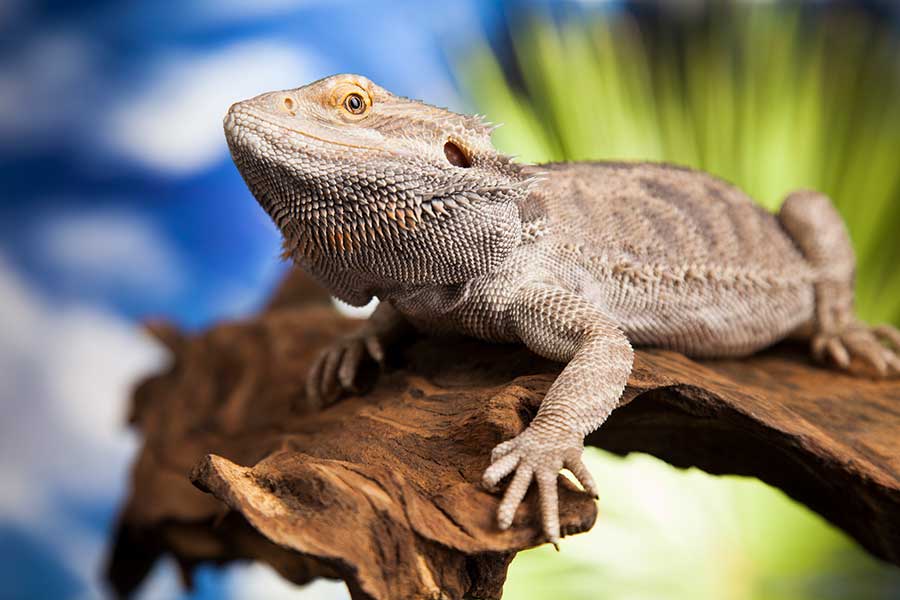
If your bearded dragon is suffering from a respiratory issues, they will have abnormal breathing as well as displaying other signs such as:
- Breathing difficulties or rapid breathing
- Coughing noises
- Drooling
- Thick, sticky mucus
- Mucus bubbles around the nostrils and mouth
- Lethargy
- Dehydration
- Loss of appetite
If you suspect a respiratory illness, take your bearded dragon to the vet immediately.
Ask The Expert

What is gaping?
The term “gaping” is used to describe a condition in bearded dragons during thermoregulation. When a bearded dragon reaches an optimum body temperature, they are seen gaping, opening their mouth longer than usual. By doing this, they tend to dissipate heat through their mouth rather than allowing it to flow through the body. Usually, beardies carry out gaping when close to the heat source, this is called “basking”. It is unusual to find your bearded dragon gaping away from the basking area, but that could be a sign that the tank might be too hot. Habitually, beardies leave their mouths open for different reasons. Observe your beardie to make sure it is not gaping for the wrong reason aside from breathing or cooling off.
What are the signs of a bearded dragon respiratory infection
It is easy to tell when your bearded dragon is having a respiratory condition, but what is more important is finding out on time. Symptoms range from abnormal sounds, head posture to discharges. Many bearded dragon owners mistake a respiratory condition for gaping. A respiratory infection in bearded dragons can show symptoms like hard breathing, the beardie will tend to put more effort than usual in breathing and stretching while at it. Putting your bearded dragon close to your ear, you could hear some clicking sounds which are as a result of bacterial growth or obstruction in the respiratory tract. You might also notice your bearded dragon snuffling, which is a way of sneezing out mucus stuck in the respiratory tract, soiling the nasal region with mucus. It is common for beardies with respiratory infection to hang their head in an uncomfortable way while sleeping. Watch closely for any of the aforementioned symptoms to know if your beardie has a respiratory infection.
Dr. Jerry is the lead Veterinary manager at Ectovis, supervising clinical and non-clinical activities to provide a better pet health service to pet owners and their pets.
He has spent half a decade developing systems, recommending and reviewing pet products. As a Veterinarian and a product review expert, Jerry has helped 100s of pets gain better health status, putting a smile on the faces of many pet owners.
Aside from working in the veterinary space, Jerry also has a flare for writing, and analyzing data.
Dr. Jerry Ayaebi (DVM, CEP) received a DVM degree for the University of Nigeria, Nsukka. He has also attained some certification in data analysis and design.
Follow him on Linkedin here
What to Do If Your Bearded Dragon is Breathing Heavily
If you're concerned that your bearded dragon is breathing abnormally, you should:
- Monitor their respiratory rate (6-10 breaths per minute is normal unless they are exercising). Their breathing rate can fall as low as 3 - 4 breaths per minute during sleep. If they are breathing more than 6 - 10 breaths per minute and you have eliminated other causes then call a vet.
- Check their enclosure for anything that could be causing stress - do they have enough clean water? Is the tank big enough? Is it the right humidity and temperature? Do they have somewhere to hide and bask? Are there loud noises or any other pets that could be causing them anxiety? Remember beardies are happiest in a calm environment.
- Have they been exercising, eating or showing off to other beardies - these are all normal causes of heavy breathing. You can help your dragon's digestion by making sure that you don't give your dragon overly large chunks of food.
- Have they been swimming or basking in their
water bowl ? If so they may need help getting rid of water in their lungs. Gently tip them at a 45-degree angle to help them release the water. - Check for other strange behaviors or signs of illness such as lack of appetite, lethargy, aggressive behaviors, coughing, mucus - if you see any of these signs alongside heavy breathing then your dragon may need veterinary care.
Remember if you notice any unusual breathing patterns and you have ruled out the normal causes then it's always a good idea to see a reptile vet to check for anything more serious.
If your bearded dragon has a bacterial infection or respiratory infection then the vet will likely give them an antibiotic treatment or antifungal medication and give you a treatment plan to follow.
At the Tail End of Things…
There are many reasons why your bearded dragon may be breathing heavily. Some of the reasons are benign and just mean your bearded dragon is exercising, digesting their food, or showing off a little.
However, if your bearded dragon is breathing heavily for an extended period of time, it can be a sign that something is wrong. Your bearded dragon may be stressed out, they may have breathed in some water during bath time or swimming time, or they may be suffering from a respiratory illness.
As a beardie owner it's important to get to know your dragon's breathing habits and make sure they're getting supportive care so they stay happy and healthy.

